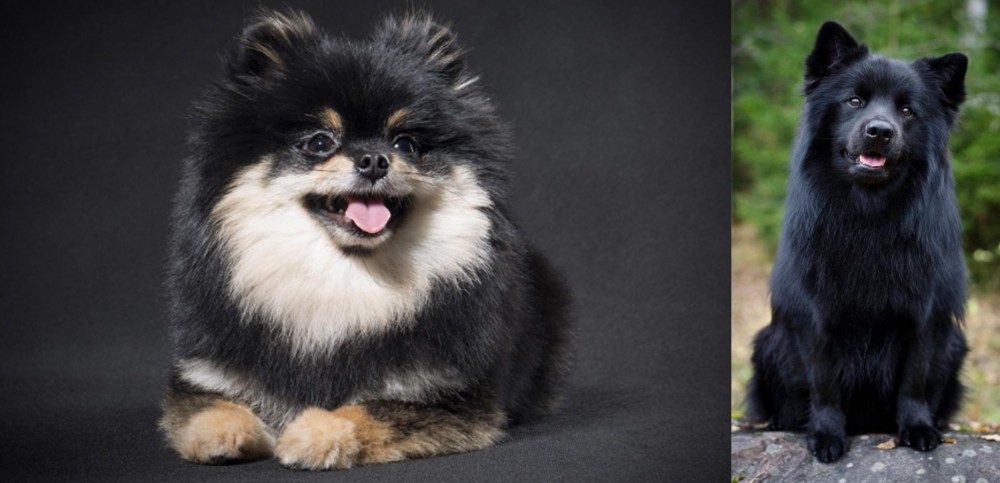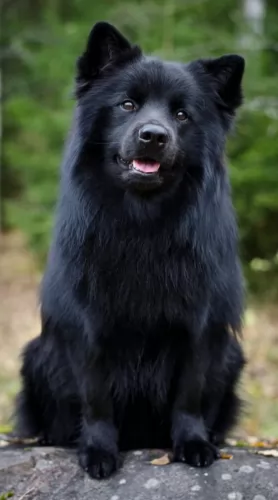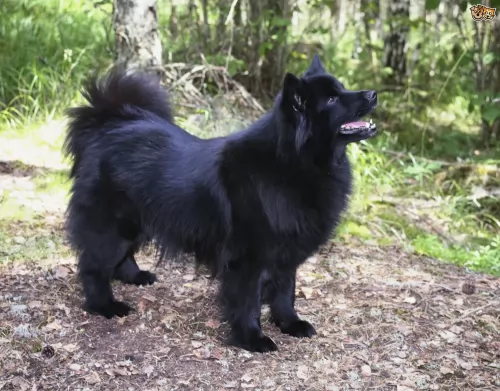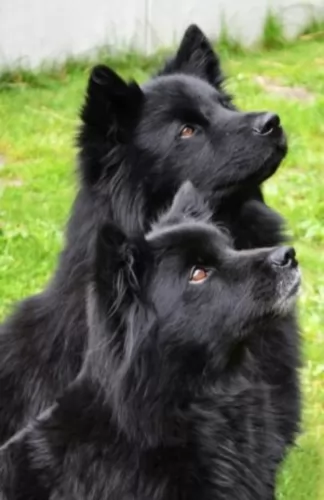 Petzlover
Petzlover German Spitz (Klein) is originated from Germany but Swedish Lapphund is originated from Sweden. German Spitz (Klein) may grow 23 cm / 9 inches shorter than Swedish Lapphund. German Spitz (Klein) may weigh 11 kg / 24 pounds lesser than Swedish Lapphund. Both German Spitz (Klein) and Swedish Lapphund has almost same life span. German Spitz (Klein) may have less litter size than Swedish Lapphund. Both German Spitz (Klein) and Swedish Lapphund requires Moderate Maintenance.
German Spitz (Klein) is originated from Germany but Swedish Lapphund is originated from Sweden. German Spitz (Klein) may grow 23 cm / 9 inches shorter than Swedish Lapphund. German Spitz (Klein) may weigh 11 kg / 24 pounds lesser than Swedish Lapphund. Both German Spitz (Klein) and Swedish Lapphund has almost same life span. German Spitz (Klein) may have less litter size than Swedish Lapphund. Both German Spitz (Klein) and Swedish Lapphund requires Moderate Maintenance.
 Also referred to as the Miniature Spitz, the German Spitz is believed to have descended from the Nordic Samoyed and Lapphund. Some dog experts say they were developed from the larger European Spitz, and that they were once referred to as Pomeranians.
Also referred to as the Miniature Spitz, the German Spitz is believed to have descended from the Nordic Samoyed and Lapphund. Some dog experts say they were developed from the larger European Spitz, and that they were once referred to as Pomeranians.
It is also thought that these dogs were in all likelihood brought over to Germany during the Middle Ages. This gives you an idea as to how ancient the breed is. There are actually 4 different Spitz breeds, divided by their sizes.
The dogs were originally used as herding and guard dogs, but today you could say that this toy breed is essentially a companion dog.
 This is a Spitz type of dog from Sweden. It is Sweden’s national dog.The dog has always been used for herding and guarding livestock such as reindeer for the Sami people.
This is a Spitz type of dog from Sweden. It is Sweden’s national dog.The dog has always been used for herding and guarding livestock such as reindeer for the Sami people.
The dog is much the same as the Finnish Lapphund, and some even believe that it might be one and the same. The American Kennel Club recognizes them as two separate breeds.
It is one of the oldest Swedish dog breeds and also one of 3 Lapphund breeds.The Swedish Kennel Club recognized the Lapphund as a distinct breed in 1903.
The Federation Cynologique Internationale recognized this dog in 1944, and the United Kennel Club in 2006.
 Classified as a toy breed, the German Spitz Klein looks like a small fox with his thick fur. He stands at between 23 – 28cm in height and he weighs 5 to 10kg.
Classified as a toy breed, the German Spitz Klein looks like a small fox with his thick fur. He stands at between 23 – 28cm in height and he weighs 5 to 10kg.
He has a sharp foxy face with small pointed upright ears and dark, bright eyes.
The double coat of the dog which can be fawn, cream, reddish, brown or black or a mixture of these colors, is straight, vibrant and off-standing to look at. He has a soft woolly undercoat. The tail of the dog curls up over the back.
The German Spitz Klein has got such a bright little face. He is a social, friendly dog, forming a strong bond with his human family. He is a smart dog too and can be easily trained.
Lively and independent, he is bold and adventurous. Even with a small dog like this, he will do well to be trained and socialized as he just becomes a better dog -obedient and relaxed around strange people and dogs.
Because of his size, he adapts well to life in the city or in the countryside. This is also because he doesn’t require a lot of exercise. The litter size for the German Spitz Klein is between 1 and 5 puppies.
 The Swedish Lapphund is a medium to large sized dog standing at between 40 to 51cm in height and weighing between 19 and 21kg.
The Swedish Lapphund is a medium to large sized dog standing at between 40 to 51cm in height and weighing between 19 and 21kg.
The head is wedge shaped and the ears erect. He has a thick double coat with fairly straight, silky hair that stands out from the body. Colors can be brown or black and sometimes there can be white markings. He sheds quite a bit, with some heavier seasonal shedding.
When you get one of these Spitz type dogs as your pet, you can be sure that you’re going to have an excellent pet and companion.
They’re independent dogs with strong wills and like to do their own thing. Training and socialization can change that and make him easy, well mannered and obedient.
They’re lively dogs and intelligent too. He is versatile, loving to be outdoors and being energetic with the children but being able to enjoy some quiet time indoors too. He is simply an excellent family pet and watchdog.
 This litle dog is seriously a case of ‘dynamite in a small package’. Bold, daring, brave, spunky, clever, playful and friendly, your confident little German Spitz Klein makes most families the perfect pet and companion.
This litle dog is seriously a case of ‘dynamite in a small package’. Bold, daring, brave, spunky, clever, playful and friendly, your confident little German Spitz Klein makes most families the perfect pet and companion.
Give him the love and attention he deserves, especially because he is undemanding and low maintenance, and with good care you’re going to have a most adoring companion for more than a decade.
 The Swedish Lapphund has always been a hardworking dog, herding reindeer for the Sami people.
The Swedish Lapphund has always been a hardworking dog, herding reindeer for the Sami people.
Today the Lapphund is a people-loving dog and wants to be constantly with his human family. He is intelligent, strong, independent, loyal, bold and loving. If you’re looking for an excellent family companion, this is it.
Do him a favor and don’t leave him outside without human companionship as he will become run-down and possibly destructive through no fault of his own. Bring him into your family and make him part of it and then he’s happy.
 You’ve got a pretty healthy little dog breed but be that as it may, it doesn’t make him totally immune to some of the common dog diseases there are. With him, you might want to look out for eye disease and epilepsy.
You’ve got a pretty healthy little dog breed but be that as it may, it doesn’t make him totally immune to some of the common dog diseases there are. With him, you might want to look out for eye disease and epilepsy.
Glaucoma occurs when there is pressure in the eye. Your dog will have pain, red eyes, dilated pupils, increased tear production and corneal cloudiness. You want to have him at the vet for this because putting off treatment can lead to blindness.
This is a condition that can gradually lead to blindness even though the eyes look normal. Difficulty with seeing at night is one symptom. Fortunately the condition is painless and your dog finds ways to cope with the problem.
It is always a good idea when you suspect anything wrong with your pet, to get him to the vet as soon as possible.
 The Swedish Lapphud is a healthy dog breed, but even so he can get one of the many common dog illnesses there are.If you choose a puppy, make sure to get your pet from a reputable breeder to avoid more serious dog illnesses.
The Swedish Lapphud is a healthy dog breed, but even so he can get one of the many common dog illnesses there are.If you choose a puppy, make sure to get your pet from a reputable breeder to avoid more serious dog illnesses.
Diabetes Mellitus is a disease you might have to watch out for with this dog breed.
This is a disease of the pancreas. This organ has two groups of cells – one produces enzymes for proper digestion and the other produces the hormone insulin which regulates the level of glucose in the bloodstream.
Diabetes is when the pancreas fails to regulate blood sugar. Your dog will have increased thirst and urination, weight loss, and increased appetite.
Type I diabetes mellitus results from destruction of the insulin-producing beta cells, which is the most common type of diabetes in dogs. Dogs with this type of diabetes require insulin injections to stabilize blood sugar. Type II diabetes is more likely in older, obese dogs.
Dogs with diabetes mellitus will require insulin each day. If canine diabetes mellitus is properly regulated, prognosis for the dog is good.
 As a feisty small-sized dog breed, your foxy little German Spitz Klein needs to get the very best food there is. If you are going to feed him a high-quality commercial dog food, make sure to read the ingredients on the packaging and buy him food according to his size and age. Mix in some home-made food from time to time and always ensure he has constant access to cool, fresh drinking water.
As a feisty small-sized dog breed, your foxy little German Spitz Klein needs to get the very best food there is. If you are going to feed him a high-quality commercial dog food, make sure to read the ingredients on the packaging and buy him food according to his size and age. Mix in some home-made food from time to time and always ensure he has constant access to cool, fresh drinking water.
He has a fairly long, thick coat, so a good brush twice a week will be adequate. While you’re brushing him, check him over for fleas and ticks too.
Always check his teeth and brush them a couple of times a week too. Bad teeth can cause a host of problems, not only with the teeth, but other parts of the body too.
He is an active, jaunty little dog that loves all kinds of games. Being a small breed, he isn’t going to be the kind of dog that you need to include in your jogging or cycling trips, but he is no couch potato, and he will love to go on a walk with you, and it also does him good to get out and about for a change of scenery.
 ●The Swedish Lapphund is an active dog and will require a high quality dog food. If you buy commercially manufactured dog food it should be appropriate to your dog’s age and activity levels.
●The Swedish Lapphund is an active dog and will require a high quality dog food. If you buy commercially manufactured dog food it should be appropriate to your dog’s age and activity levels.
Home-made food like boiled chicken, brown rice, spinach and sweet potatoes will do your pet the world of good, and chopped up, it can be added a couple of times a week to the dog’s dry kibble.
Try and feed some raw met occasionally as well. Clean, fresh water should be available at all times.
●The Lapphund is an active dog and he is going to reguire daily exercise that will keep him mentally and physically fit. Having a dog like this requires you being active yourself, and your Lapphund is going to love going on long walks or hikes. He will never get enough games with the children – he just loves the rough and tumble.
● Have his vaccines attended to. There are training classes as well as boarding kennels that won’t accept your dog unless his vaccines are up to date.
● Have your dog spayed or neutered if you don’t want your dogs to have puppies.
● Brush his coat twice a week. Check inside his ears and inside his mouth for redness and infection.